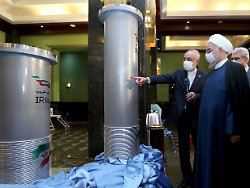Monday, May 24, 2021
“A kind of stopgap solution”
Atomic Energy Agency extends deal with Iran
While the negotiations on the nuclear deal with Iran are still ongoing, the inspectors of the International Atomic Energy Agency are in danger of losing access to the Iranian nuclear facilities. This is prevented at the last moment. The result is not “ideal”, says the IAEA chief.
The interim agreement between Tehran and the International Atomic Energy Agency (IAEA) to monitor the Iranian nuclear program, which expired on Friday, has been extended by one month. The review and monitoring will continue until June 24, IAEA chief Rafael Grossi said at a press conference. The technical agreement on atomic inspections concluded in February was intended to prevent restrictions on the monitoring of the Iranian nuclear program – and was limited to three months.
Talks between representatives of the IAEA and Iran about a possible extension have been going on since last week. The transitional agreement gives UN inspectors access to the Iranian nuclear facilities. However, the government in Tehran suspended controls on non-nuclear facilities and is urging the lifting of US sanctions against the country.
The result of this “long discussion” was “important”, but the situation was “not ideal,” said Grossi. “We should all be reminded that the provisional agreement is kind of a stopgap measure.” Above all, avoid “flying completely blind,” he added.
It was feared that the expiry of the agreement could have negative consequences for the ongoing negotiations in Vienna on the 2015 nuclear deal. The Vienna talks are, among other things, about a return of the USA to the agreement.
USA and Iran are not at the same table
The negotiations in Vienna would depend on a “political decision” by the USA, Iran said meanwhile. US Secretary of State Antony Blinken had previously said it remained unclear whether Iran was “ready and willing” to take the necessary steps to return to compliance with the nuclear deal.
The EU, Germany, France, Great Britain, China and Russia are negotiating directly with Iran on the 2015 nuclear deal. A US delegation is also present in Vienna. But she is not sitting at the same table with the Iranian representatives.
The nuclear deal is designed to prevent Tehran from gaining the ability to build an atomic bomb. The United States withdrew from the agreement in 2018 under then-President Donald Trump and put new massive sanctions in place against Iran. In response, Tehran gradually withdrew from its obligations under the agreement.
Trump’s successor, Joe Biden, has in principle declared himself ready to start new direct negotiations with Iran, but insists that the country must first abide by its obligations under the nuclear agreement. Iran, in turn, makes the lifting of US punitive measures a precondition.
.
